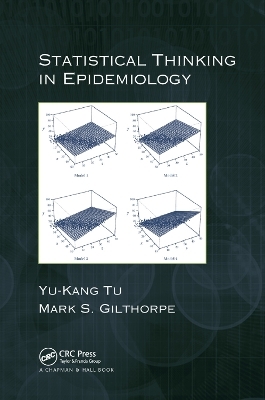
Statistical Thinking in Epidemiology
Chapman & Hall/CRC (Verlag)
978-0-367-38255-1 (ISBN)
Statistical Thinking in Epidemiology is about thinking statistically when looking at problems in epidemiology. The authors focus on several methods and look at them in detail: specific examples in epidemiology illustrate how different model specifications can imply different causal relationships amongst variables, and model interpretation is undertaken with appropriate consideration of the context of implicit or explicit causal relationships. This book is intended for applied statisticians and epidemiologists, but can also be very useful for clinical and applied health researchers who want to have a better understanding of statistical thinking.
Throughout the book, statistical software packages R and Stata are used for general statistical modeling, and Amos and Mplus are used for structural equation modeling.
Dr Yu-Kang Tu is a Senior Clinical Research Fellow in the Division of Biostatistics, School of Medicine, and in the Leeds Dental Institute, University of Leeds, Leeds, UK. He was a visiting Associate Professor to the National Taiwan University, Taipei, Taiwan. First trained as a dentist and then an epidemiologist, he has published extensively in dental, medical, epidemiological and statistical journals. He is interested in developing statistical methodologies to solve statistical and methodological problems such as mathematical coupling, regression to the mean, collinearity and the reversal paradox. His current research focuses on applying latent variables methods, e.g. structural equation modeling, latent growth curve modelling, and lifecourse epidemiology. More recently, he has been working on applying partial least squares regression to epidemiological data. Prof Mark S Gilthorpe is professor of Statistical Epidemiology, Division of Biostatistics, School of Medicine, University of Leeds, Leeds, UK. Having completed a single honours degree in mathematical Physics (University of Nottingham), he undertook a PhD in Mathematical Modelling (University of Aston in Birmingham), before initially embarking upon a career as self-employed Systems and Data Analyst and Computer Programmer, and eventually becoming an academic in biomedicine. Academic posts include systems and data analyst of UK regional routine hospital data in the Department of Public Health and Epidemiology, University of Birmingham; Head of Biostatistics at the Eastman Dental Institute, University College London; and founder and Head of the Division of Biostatistics, School of Medicine, University of Leeds. His research focus has persistently been that of the development and promotion of robust and sophisticated modelling methodologies for non-experimental (and sometimes large and complex) observational data within biomedicine, leading to extensive publications in
Introduction. Vector Geometry of Linear Models for Epidemiologists. Path Diagrams and Directed Acyclic Graphs. Mathematical Coupling and Regression to the Mean in the Relation between Change and Initial Value. Analysis of Change in Pre-/Post-Test Studies. Collinearity and Multicollinearity. Is ‘Reversal Paradox’ a Paradox? Testing Statistical Interaction. Finding Growth Trajectories in Lifecourse Research. Partial Least Squares Regression for Lifecourse Research. Concluding Remarks. References. Index.
| Erscheinungsdatum | 24.09.2019 |
|---|---|
| Sprache | englisch |
| Maße | 156 x 234 mm |
| Gewicht | 453 g |
| Themenwelt | Mathematik / Informatik ► Mathematik ► Statistik |
| Studium ► Querschnittsbereiche ► Epidemiologie / Med. Biometrie | |
| Naturwissenschaften ► Biologie | |
| ISBN-10 | 0-367-38255-5 / 0367382555 |
| ISBN-13 | 978-0-367-38255-1 / 9780367382551 |
| Zustand | Neuware |
| Haben Sie eine Frage zum Produkt? |
aus dem Bereich


